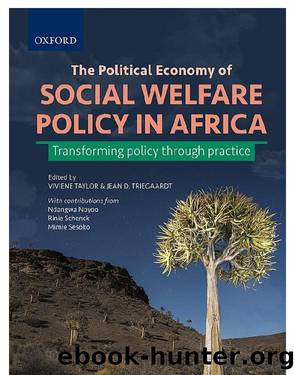The Political Economy of Social Welfare Policy in Africa by Unknown

Author:Unknown
Language: eng
Format: epub
Published: 2022-02-22T00:00:00+00:00
7.4 Background and context
Just like in other parts of Africa, the African people had their own forms of indigenous welfare systems which were underpinned by African value systems of the various ethnic groups of South Africa. Therefore, the development of social welfare policy in South Africa is deeply rooted in the history of colonial conquest and occupation, on the one hand, and apartheid, on the other. It is also embedded in the traditional social fabric of the indigenous African populations of this country. In this sense, the beginnings of social welfare and, later, social welfare policy in South Africa are directly linked to the initial annexation of the Cape peninsula and eventual subjugation of indigenous peoples by a white settler population.
Krotoa, the niece of the Khoi Chief Autshumao, worked as a domestic worker and interpreter in Jan van Riebeeckâs household in the 1650s when the Dutch colonised the Cape
Colonial conquest, industrial development, and the institutionalisation of racism that culminated in the creation of an apartheid state in 1948 are all important milestones that shaped the social welfare system and social welfare policy in the country. Earlier sections of this book discussed the background to colonial occupation and apartheid as well as the development of social welfare in South Africa in detail. In this chapter, it is important to mention that the foregoing issues had a bearing on indigenous familiesâ existence and continue to influence them in present times. Colonial rule led to the annexation of the land of the indigenous people and displaced their families. The discovery of diamonds and gold in the late nineteenth century and subsequent industrialisation, dismantled the African peasantry, which would become the chief source of cheap unskilled labour (Marais, 2001).
The Green Paper on the Family observes that the sole purpose of Africans in the colonial and apartheid era was that of labourers (i.e. labour inputs) for the capitalist economy. With time, other laws were passed in order to keep Africans in impoverished and economically unviable geographic locations with little or no employment opportunities (Department of Social Development, 2011). Furthermore:
âColonial conquest and exploitation weakened the African family on two key fronts. Firstly, enforced labour migration compelled families to live apart. Secondly, the policies, laws and practices were aimed at impoverishing African families, which also had dire long-term consequences for themâ
(Department of Social Development, 2011: 25).
Download
This site does not store any files on its server. We only index and link to content provided by other sites. Please contact the content providers to delete copyright contents if any and email us, we'll remove relevant links or contents immediately.
The Secret History by Donna Tartt(19052)
The Social Justice Warrior Handbook by Lisa De Pasquale(12187)
Thirteen Reasons Why by Jay Asher(8893)
This Is How You Lose Her by Junot Diaz(6877)
Weapons of Math Destruction by Cathy O'Neil(6264)
Zero to One by Peter Thiel(5786)
Beartown by Fredrik Backman(5737)
The Myth of the Strong Leader by Archie Brown(5499)
The Fire Next Time by James Baldwin(5431)
How Democracies Die by Steven Levitsky & Daniel Ziblatt(5215)
Promise Me, Dad by Joe Biden(5141)
Stone's Rules by Roger Stone(5081)
A Higher Loyalty: Truth, Lies, and Leadership by James Comey(4954)
100 Deadly Skills by Clint Emerson(4921)
Rise and Kill First by Ronen Bergman(4779)
Secrecy World by Jake Bernstein(4741)
The David Icke Guide to the Global Conspiracy (and how to end it) by David Icke(4707)
The Farm by Tom Rob Smith(4502)
The Doomsday Machine by Daniel Ellsberg(4484)
